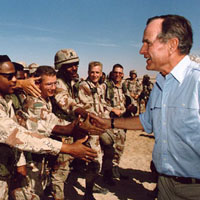Milestones: 1990-2000
1990-2000: The Post-Cold War Era
The collapse of the Soviet Union in 1991 created a massive shift in the international balance of power and left the United States as the sole remaining superpower.

President George H.W. Bush greeting the U.S. soldiers in Iraq during the Gulf War.
Early conflicts like the Iraqi invasion of Kuwait that led to the Gulf War and clashes in the newly independent Balkan states brought the United States together with new allies to solve international problems. President George H.W. Bush defined the shift as a “New World Order,” and for the first time since World War II, the United States and Russia fought together on the same side of a conflict. The administrations of President William J. Clinton during the 1990s were shaped by attempts by American foreign policymakers to redefine what constituted a “threat” and what foreign policy would serve the “national interest” in the post-Cold War era. Some experts argued that the United States should work toward preventing ethnic conflict and genocide in places such as Somalia, Bosnia, Rwanda and Kosovo. Others maintained that U.S. foreign policy should focus instead on preserving U.S. economic and trade interests.
